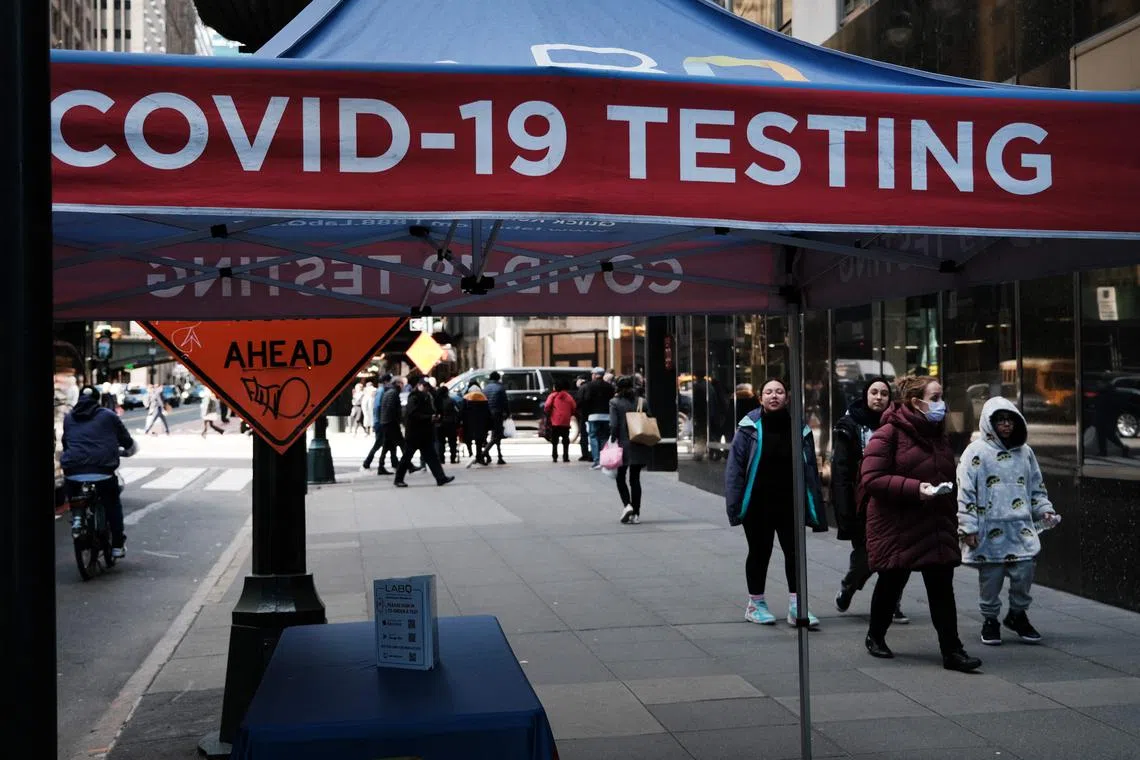WHO warns Covid-19 pandemic still volatile
Sign up now: Get ST's newsletters delivered to your inbox

In the last 28 days, more than 23,000 deaths and three million new cases have been reported to the WHO.
PHOTO: AFP
GENEVA - The World Health Organisation (WHO) on Tuesday warned that the Covid-19 pandemic is still volatile, saying there could be further trouble before the virus settles into a predictable pattern.
In the preceding 28 days, more than 23,000 deaths
While the numbers are decreasing, “that’s still a lot of people dying and that’s still a lot of people getting sick”, WHO health emergencies programme director Michael Ryan told a press conference.
He said respiratory viruses do not pass from a pandemic to an endemic phase, but instead move to low levels of activity with potentially seasonal epidemic peaks.
“We don’t turn off a pandemic switch,” said Dr Ryan.
“It’s much more likely that we’re going to see... a bumpy road to a more predictable pattern.”
The WHO’s emergency committee on Covid-19 meets every three months and is due to assemble in early May.
As at its previous meetings, it will decide whether the virus still constitutes a public health emergency of international concern (PHEIC) – the highest level of alert that the UN health agency can sound.
The WHO declared Covid-19 a PHEIC on Jan 30, 2020, when there were fewer than 100 cases and no deaths outside China.
But it was not until WHO chief Tedros Adhanom Ghebreyesus described the situation as a pandemic in March 2020 that the world was jolted into action.
Dr Ryan said the virus would not be eliminated and would, like influenza, still cause significant respiratory disease in vulnerable people.
Some countries still have large populations of highly vulnerable people who are unvaccinated, he said, while in others, Covid-19 is no longer an emergency event.
The Covid-19 committee presents its advice to Dr Tedros – who has the final say – on whether the virus still constitutes a PHEIC.
“I would hope that as the emergency committee meets in May, they will have further positive advice to give Dr Tedros around their assessment of the trajectory of the pandemic and the existence or not of a PHEIC,” said Dr Ryan.
Some countries have seen their number of coronavirus cases climbing since governments progressively ditched their Covid-19 rules and allowed people to mingle maskless.
India, where a new Covid-19 sub-variant called Arcturus is fuelling a surge of cases, reported on Wednesday that 10,542 cases were registered in 24 hours, up from 7,633 cases in the previous 24-hour period, according to data shared by the Health Ministry.
Alarmed by the spurt in cases, West Bengal state in eastern India on Tuesday issued fresh guidelines, advising its residents to put their masks back on, use hand sanitiser, and avoid mass gatherings.
In Hanoi, the worst affected city in Vietnam, the local government has updated its Covid-19 control guidelines ahead of a five-day holiday which starts on April 29, asking people to wear masks in crowded public places.
Vietnam has recorded a rapid spread of Covid-19 in the first half of April, from 278 cases in the first week of the month to 2,000 cases in the second week.
Hanoi has been affected the most, with an average of 96 new cases a day, said the city’s centre for disease control. AFP, XINHUA


